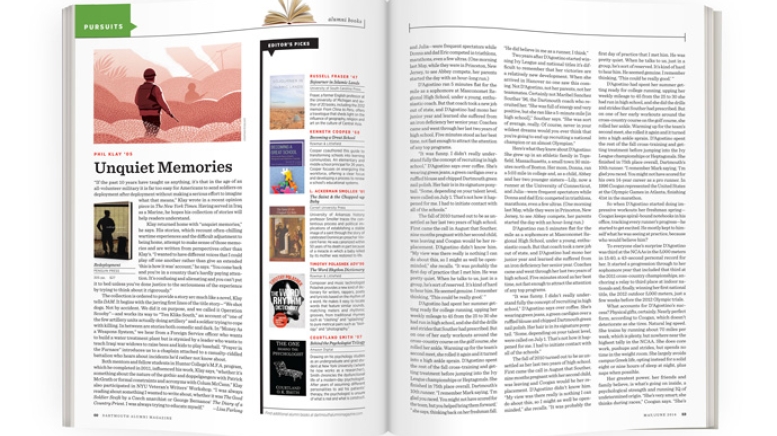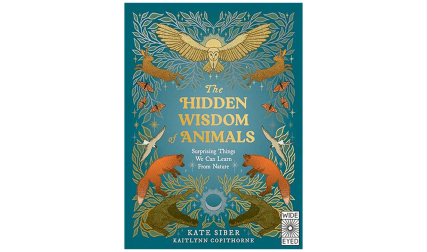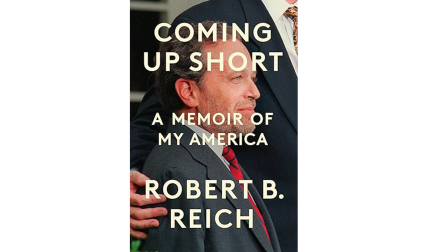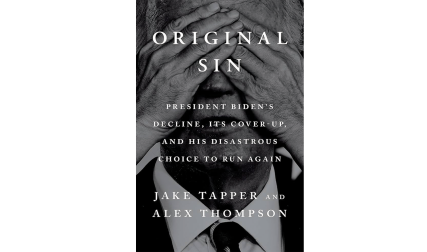Phil Klay ’05
Redeployment
Penguin Press
“If the past 10 years have taught us anything, it’s that in the age of an all-volunteer military it is far too easy for Americans to send soldiers on deployment after deployment without making a serious effort to imagine what that means,” Klay wrote in a recent opinion piece in The New York Times. Having served in Iraq as a Marine, he hopes his collection of stories will help readers understand.
Klay returned home with “unquiet memories,” he says. His stories, which recount often-chilling wartime experiences and the difficult adjustment to being home, attempt to make sense of those memories and are written from perspectives other than Klay’s. “I wanted to have different voices that I could play off one another rather than give an extended ‘this is how it was’ account,” he says. “You come back and you’re in a country that’s hardly paying attention. It’s confusing and alienating and you can’t put it to bed unless you’ve done justice to the seriousness of the experience by trying to think about it rigorously.”
The collection is ordered to provide a story arc much like a novel, Klay tells DAM. It begins with the jarring first lines of the title story—“We shot dogs. Not by accident. We did it on purpose, and we called it Operation Scooby”—and works its way to “Ten Kliks South,” an account of “one of the few artillery units actually doing artillery” and a soldier trying to cope with killing. In between are stories both comedic and dark. In “Money As a Weapons System,” we hear from a Foreign Service officer who wants to build a water treatment plant but is stymied by a leader who wants to teach Iraqi war widows to raise bees and kids to play baseball. “Prayer in the Furnace” introduces us to a chaplain attached to a casualty-riddled battalion who hears about incidents he’d rather not know about.
Both mentors and fellow students in Hunter College’s M.F.A. program, which he completed in 2011, influenced his work, Klay says, “whether it’s something about the nature of the gothic and doppelgangers with Patrick McGrath or formal constraints and acronyms with Colum McCann.” Klay also participated in NYU Veteran’s Writers’ Workshop. “I was always reading about something I wanted to write about, whether it was The Good Soldier Svejk by a Czech anarchist or George Bernanos’ The Diary of a Country Priest. I was always trying to educate myself.” —Lisa Furlong
Russell Fraser ’47
Sojourner in Islamic Lands
University of South Carolina Press
Fraser, a former English professor at the University of Michigan and author of 20 books, including the 2012 memoir From China to Peru, offers a travelogue that sheds light on the influence of geography, religion and art on the culture of Central Asia.
Kenneth Cooper ’68
Becoming a Great School
Rowman & Littlefield
Cooper coauthored this guide to transforming schools into learning communities. An elementary and middle school principal for 26 years, Cooper focuses on energizing the workforce, offering a clear focus and developing a process to renew a school’s educational systems.
L. Ackerman Smoller ’81
The Saint & the Chopped-up Baby
Cornell University Press
University of Arkansas history professor Smoller traces the contentious process and political implications of establishing a stable image of a saint through the story of celebrated Dominican preacher Vincent Ferrer. He was canonized within 50 years of his death in part because of a miracle in which a baby killed by its mother was restored to life.
Timothy Polashek Adv’96
The Word Rhythm Dictionary
Rowman & Littlefield
Composer and music technologist Polashek provides a new kind of dictionary for writers, rappers, poets and lyricists based on the rhythm of a word. He makes it easy to locate words that feature similar sounds, matching meters and rhythmic grooves, from traditional rhymes such as “clashing” and “splashing” to pure metrical pairs such as “biology” and “photography.”
Courtland Smith ’07
Behind the Psychologist Trilogy
Amazon Digital
Drawing on his psychology studies as an undergraduate and grad student at New York University (where he now works as a researcher), Smith chronicles the dysfunctional life of a modern-day psychologist. After years of assuming different personalities to aid his patients’ therapy, the psychologist is unsure of what is real and what is construct.
Additional books that were not listed in our print version:
Film writer and director Norman Weissman ’46 reflects on the nature of violence and failed ideologies with a collection of vignettes describing the futility of war in his latest novel, Oh Palestine: The Dream Deferred (Hammonasset House).
Lynmar Brock Jr. ’55, Tu’56, reflects on the implicit and explicit clout of morality, particularly as outlined in the Ten Commandments, in his fourth novel, The Inn of Ten (CreateSpace).
Economist and geopolitical commentator David Smith ’62 explains how present economic and political dysfunctions emerged and proposes a new democratic process that bypasses the rich elite to return government to the people in The Predicament: How Did It Happen? How Bad Is It? The Case for Radical Change Now! (Sic Itur Ad Astra Publishers).
Université Jean Moulin Lyon 3 professor C. Jon Delogu ’85 grapples with questions about the possibility and conditions of current-day democracy in his general introduction to French political thinker Alexis de Tocqueville in Tocqueville and Democracy in the Internet Age (Open Humanities).
Middlebury computer science professor and J.R.R. Tolkien scholar Matthew Dickerson ’85 chronicles the journey of a young monk who discovers his princely identity in an historical romance set in medieval times, The Rood and the Torc: The Song of Kristinge, Son of Finn (Wings Press).
Bonnie An Henderson ’89, DMS’93, a partner at Ophthalmic Consultants of Boston and a professor at Tufts University School of Medicine, provides detailed information and advice for beginning and practicing cataract surgeons as editor of the reference text, Essentials of Cataract Surgery, Second Edition (Slack Inc.).
Andrew Field ’91, the director of Shanghai programs for Boston University, translates six short stories of Mu Shiying, one of the more detailed chroniclers of Shanghai’s Jazz-Age nightlife, in Mu Shiying: China’s Lost Modernist (Hong Kong University Press).
Children’s author and Whistler, British Columbia, teacher-librarian Sara Leach ’93 follows a young dancer’s challenges as she struggles to keep her team together in Warm Up (Orca Book).
Ashley Tudor ’02, a design strategist specializing in health (see a profile on her in the Sept/Oct 2013 issue), advocates for a personalized natural diet in her second book, Perfecting Paleo (Victory Belt).
Michael Gale ’09 shares the true story of the harrowing journey of a young woman—who would later raise him—across the country to escape an endless cycle of abuse in She Can Fly: A Domestic Violence Survival Story (Resistance Publishing).




